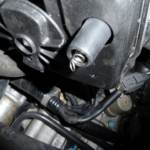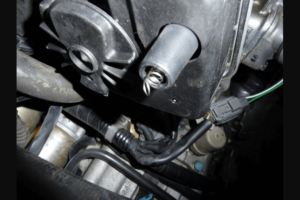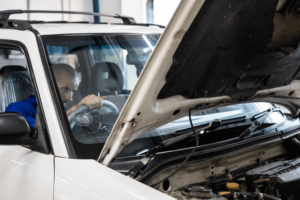It’s disturbing to have your car squeaking, especially to your neighbors. Your neighbors know you’re coming in or out of your driveway. In this article, I’ll discuss car squeaking when driving – the leading cause.
Some of the primary causes of a squeaking car when it is being driven are the following:
- Alternator bearings are worn out.
- Worn-out brake pads
- Worn-out accessory or V-belt
- Issues with the suspension system
- Problems with the serpentine belt
- Issues with the steering system
- Malfunctioning water pump pulley or cam belt
Aside from squeaking brakes, one of the most common noises is typically connected to your vehicle’s suspension system. Some of its suspension components are prone to producing noises when they are not adequately lubricated. Metal-to-metal contact occurs on the steering linkage, suspension joints, and tie-rods.
Read on to learn more about the leading causes of squeaking noises each time you drive your car and how you can silence these noises.
Also, we hope you find the links here useful. We may get a commission if you purchase something through a link on this page, so thank you!
Car Squeaking When Driving

If you hear an annoying high-pitched squeal from a car when moving, there are certain things that you can suspect as probable causes. Some of the leading causes of these noises are the following:
- Your alternator bearings have worn down already.
- Worn-out brake pads
- The accessory or V-belt has ground down
- There are problems with your suspension system.
- Your serpentine belt has problems.
- Your steering wheel is experiencing some issues
- The water pump or cam belt is malfunctioning.
The worn-out brake pads are the most common car parts that create squeaking noises when a car is being driven. But besides that, a malfunctioning suspension system is also a common culprit. The noise is caused by inadequate lubrication.
So, metal-to-metal contact between suspension components occurs. That causes the steering linkage, the suspension joints, and the tie-rod ends to create squeaking noises and eventually wear out and develop issues.
You can stop these squeaking noises by installing a set of shims on the brake pads. This will prevent the vibrations and make the squeaking noises fade away.
If you use shims, you will ensure that the brake pads are tightly fastened to the brake calipers. This will reduce and possibly eliminate the vibrations that create the squeaks.
Don’t be so disconcerted when your brake pads produce squeaking noises. They are designed to create these noises to warn you when it’s time you need to replace them.
So, each time you hear your car squeaking when driving slow or fast, you need to seek the help of a qualified mechanic to trace where they are coming from and fix the problem.
Why Is Your Car Squeaking When Driving?
Your car makes squeaks and other annoying noises because it is experiencing minor problems which can be fixed easily. So, don’t be so worried about it. Of course, it isn’t very pleasant to hear your car squeaking when driving over bumps. And it is also annoying to your neighbors.
While this is a small problem, you can’t ignore it because it hints that something is wrong with your vehicle. You should still do your best to look at its root cause to prevent a bigger problem you may face.
Consider squeaking noises as early warning signals that your vehicle has a problem, though small at this time. You should still seek the advice of a qualified mechanic as to what you need to do. Remember that your legal responsibility is keeping your car running as efficiently as possible.
What Could Create Squeaking Noises in Your Car?
If you know what parts of your vehicle can produce the squeaks, you already have the battle half won. So, where are the usual places that can create squeaks when you drive your car? Consider these car components:
1. Worn Out Suspension System Component
If the mechanic traces the squeaking noise from a component of your car’s suspension system, it could foretell a bigger problem in the future.
The noise could be triggered by a worn-out component from the shock absorbers, bushes, ball joints already worn out, and springs. It could also be caused by loss of lubrication on any of these components.
2. Brake Pads Need a Replacement
The brakes are your first defense against a car crash. So, be thankful that your brakes squeak to warn you that its brake pads are crying for replacements. This is their first call for your help – so be attentive to their calls, and they will give you the utmost safety every time you drive your car.
Click here to see this BOSCH BC1293 QuietCast Premium Ceramic Disc Brake Pad Set on Amazon.
Your brake pads are telling you that they are already so thin that they can’t possibly provide the best service they can give. You are fortunate if your car has brake pad sensors that alert you when it’s time to replace them.
But if you don’t have these sensors on your car, be thankful that you have another warning bell that will warn you of the danger – the squeaking noises every time you step on the brakes.
3. V-belt Issue
If you hear a squeaking noise while driving but no brakes are applied every time you speed up or slow down, it could be a problem with the V-belt of your engine. It is perhaps experiencing problems because it has developed holes or cracks in its body.
This V-belt drives all the auxiliary components of your car. So, if it is damaged and fails, it will force your vehicle to stop or malfunction. Replacing this belt is not that difficult if a qualified mechanic does it.
4. Misaligned Wheels, Underinflated Tires, Etc.
If the squeaks come out whenever you are turning your car, the cause could be one of these three issues:
- Wheels are not aligned
- Tires are underinflated
- Tires have uneven tread wear
Don’t ignore the squeaking noise from the wheel when driving because one of your legal requirements is to keep your tires well-maintained and replaced if needed. It can affect insurance coverage if you don’t.
So, if you suspect your tires are where the squeaks are coming from, check them for any imperfections.
5. Misaligned or Malfunctioning Pulley
The air conditioner, the idler, the power steering, and the alternator are some parts of your car that are driven by pulleys. These car components also have bearings that help them rotate smoothly.
If any of these bearings get bad, its pulley will wobble, which will cause it to create squeaking noises.
A misaligned or broken pulley can be the culprit as well. The belt on a pulley is supposed to run straight while rotating. A pulley moving from side to side will create a squeaking noise. If you replace the belt of the offending pulley, the squeaks will stop.
6. Loose or Worn-out Timing Belt
The cam belt or the timing belt is a critical part of your engine. It ensures the synchronized rotation of the camshaft and the crankshaft. Car manufacturers have established guidelines on when their timing belts should be replaced.
If your timing belt creates squeaking noises, it may be loose or worn out. When a timing or cam belt is no longer taut or tight to its pulley, it’s time to replace it. If it is broken, all the more it needs to be replaced.
7. Power Steering Issue
What if you hear a squeaking noise from the front wheel when driving? If the squeaking noise is produced while turning the steering wheel, your car has an issue with its power steering.
This is dangerous if your steering gives up while you are driving. All the components of your power steering can affect your steering performance.
Click here to see this Pentosin 1405116 CHF 11S Long-Life Synthetic Hydraulic Fluid on Amazon.
The pump, the steering, or the hose can cause your steering system to be faulty. For instance, if the power steering fluid is low or dirty, it will create squeaking noises. This fluid is there to lubricate the power steering system. So any drop in its level or contamination will produce squeaks.
Click here to see this Honda 08206-9002PE Power Steering Fluid on Amazon.
8. Malfunctioning Water Pump Pulley
There are cases when the squeaks seem to be coming from the cam belt, but in reality, it is coming from a malfunctioning water pump pulley. The pulley could produce noise because of bad bearings.
Eventually, a malfunctioning bearing will fail. This will cause the overheating of the engine, which can lead to a costly engine repair.
9. Slipping Serpentine Belt or Misaligned Engine Pulley
If the squeaking noise starts as you begin to turn the ignition key, it could be caused by two things:
- Slipping serpentine belt, or
- Misaligned engine pulley
The serpentine belt is the primary rotating force of your power steering, air conditioner, fan, alternator, and at times, the water pump.
If this belt is already worn out, or if the tension is already lacking, or if it is too tight hugging any of the pulleys, then squeaking noises will be created.
The pulley in the engine or any of the pulleys used to rotate any of these car parts can fail. If that happens, you will hear squeaking noises from the offending bearing, wherever it is.
Ask the mechanic to check if the belt tensioner still provides the proper tension or pressure to the serpentine belt. If it is too loose, it can create squeaking noises. It could also worsen, so it can no longer function as before.
Again, why does a car squeak when you drive? A car usually squeaks when driving due to its suspension’s lack of lubrication. This results in the metal-on-metal tear among the tie rod, steering linkage, and suspension joints.
What You Need to Know About Modern Vehicles
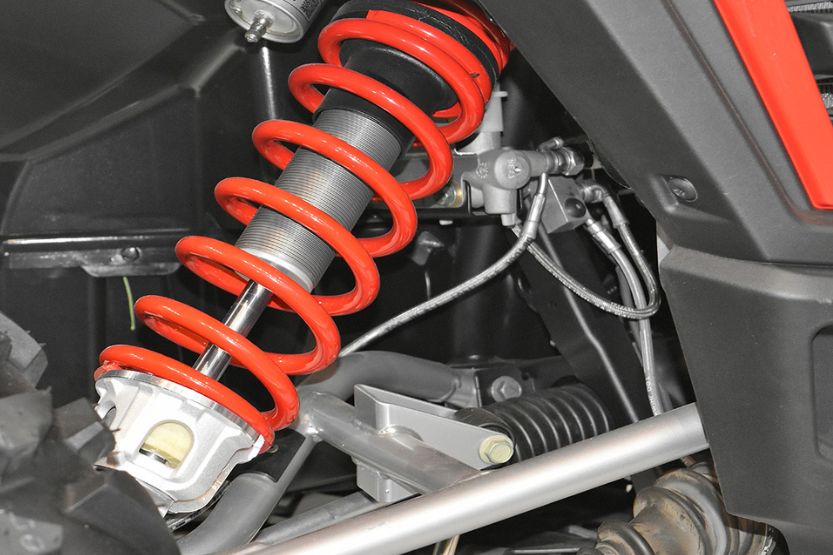
In general, one way of taking care of your car so it won’t make squeaky noises is by understanding the workings of a modern car. You need to know how your vehicle operates before you devise ways to make it work well.
Here are some things that you need to need to know about modern cars:
1. Let the Experts Perform Lubrication on the Sealed Suspension Joints
A lot of modern automobiles are equipped with sealed suspension joints. They come from the factory already lubed for their entire lifespan. As such, it is impossible to add lubricating oil when the original lubricating oil is starting to deteriorate or is getting low.
You are advised to let the experts do the lubrication if your vehicle’s ride height is very low. They have a vehicle rack where they can do the re-lubrication more conveniently. They also have the required safety tools to lift your vehicle safely.
2. Use Silicone Spray to Maintain the Coil Springs
The leaf or coil springs of modern vehicles, which smoothens the ride, are also often the cause of the squeaking noises. They can be best serviced with silicone spray instead of grease because of their plastic inserts.
3. Lubricate the High Suspension with a Grease Gun
Some modern cars and trucks are equipped with high suspensions. These vehicles allow their owners to safely access the suspension joints to lubricate them using a grease gun.
Click here to see DEWALT 20V MAX Cordless Grease Gun on Amazon.
4. Check Whether the Front-wheel Drive Fittings Require Lubrication
Vehicles with front-wheel drives may have additional fittings that require lubrication. So, check if your car needs lubrication in all its connected parts.
How to Prevent Your Car’s Squeaking Noises
Keeping up with its care and maintenance will help you prevent it from producing squeaky noises. Additionally, you must observe how your car performs each time you drive it. Only then can you achieve a reasonable care and maintenance routine.
However, no matter how regularly you maintain your vehicle, it may still create squeaking noises somewhere. So how do you prevent these annoying noises?
1. Replace What Needs to Be Replaced
If you don’t want to be burdened by squeaking noises from your car each time you drive it, you have to replace whatever is broken in the probable culprit of the squeaky noise. If it’s the serpentine belt, change it.
But if it is the lubrication of certain jointed parts, you need to have it lubricated by a professional mechanic. If it’s a pulley’s bad bearing, then change it.
2. Ensure that the Suspension Is Adequately Lubricated
Since squeaky noises usually come from insufficiently lubricated suspension parts, ensure that you have a regular schedule of suspension system lubrication.
3. Check Your Brakes Regularly
And since squeaking brakes are also the most common, you must be conscientious in inspecting your brake pads and the other braking system components. Replace thinned-out brake pads. Don’t wait for them to squeak before you replace them. This move is also applicable to your tires.
Frequently Asked Questions
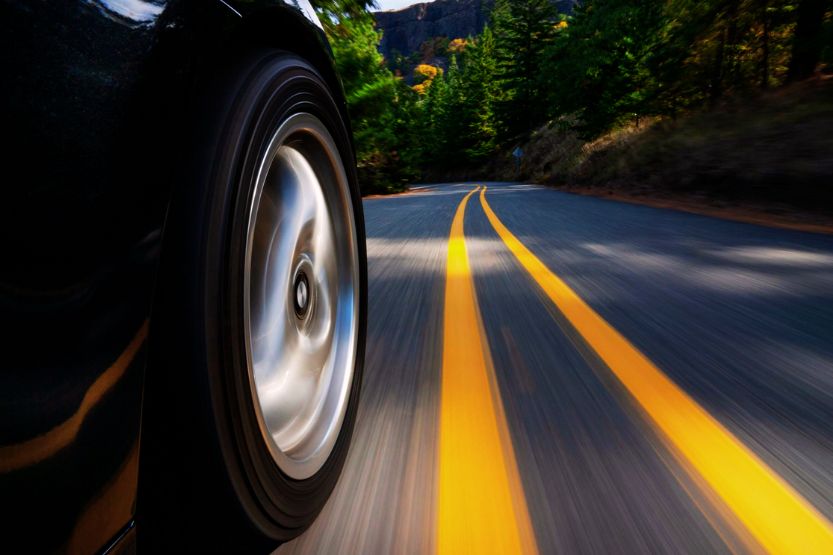
If you still have some questions about our topic today, perhaps you will get your exact answer from the ones listed below:
What Are the Main and Common Causes of Squeaking Noises While Driving My Car?
Some of the primary causes of squeaky noises in cars are the following:
- Your alternator bearings are already worn out
- Your brake pads need to be replaced
- The accessory or V-belt of your vehicle is already bad
- Your suspension system has problems
- There are issues in your serpentine belt
- Your steering wheel is experiencing some problems
- The water pump or cam belt is not working
How Can I Stop My Car from Squeaking While I Am Driving It?
You have to pinpoint the exact cause of the squeaky noise. It is important to know where the noise is coming from. So, you need to know the most common car part that squeaks. But there’s one common solution to this problem.
Since bad brakes create the most squeaky noises, you can install a set of shims to stop them from vibrating, which causes them to make these noises.
The shims will ensure that the brake pads are fastened tightly to their respective brake calipers. Usually, these shims also come with rubber pads that help to reduce vibrations.
Is It Safe for Me to drive my car even if it creates noisy noise?
It depends on the cause of the squeaky noise. You can still safely drive your car if the reason is only a loose connection or a thinned-out brake pad. But it would be best if you tried to replace the broken part as soon as possible.
If the cause of the noise is coming from a faulty serpentine belt, you risk greater damage to your engine. So, you need to evaluate whether the reason is severe before you can drive your car even for a short distance.
In Closing: Main Causes of Squeaking When Driving
Among the primary causes of squeaking noises that your car produces every time you drive it are the following:
- Worn-out alternator bearings
- Worn-out brake pads
- The accessory or V-belt is already worn out
- There are problems with your suspension system.
- Your serpentine belt has some issues.
- Steering system issues
- A malfunctioning water pump pulley or cam belt
Some of the causes of the squeaky noise may be inconsequential, but it’s not right to ignore them. Some of these causes might not be severe, but they can still lead to serious problems in the future. So, it’s better to check and fix them as they come.









![Car Making a Creaking Noise When Driving Slow [7 Causes] car making a creaking noise when driving slow](https://roadsumo.com/wp-content/uploads/2022/07/car-making-a-creaking-noise-when-driving-slow-150x150.jpeg)

